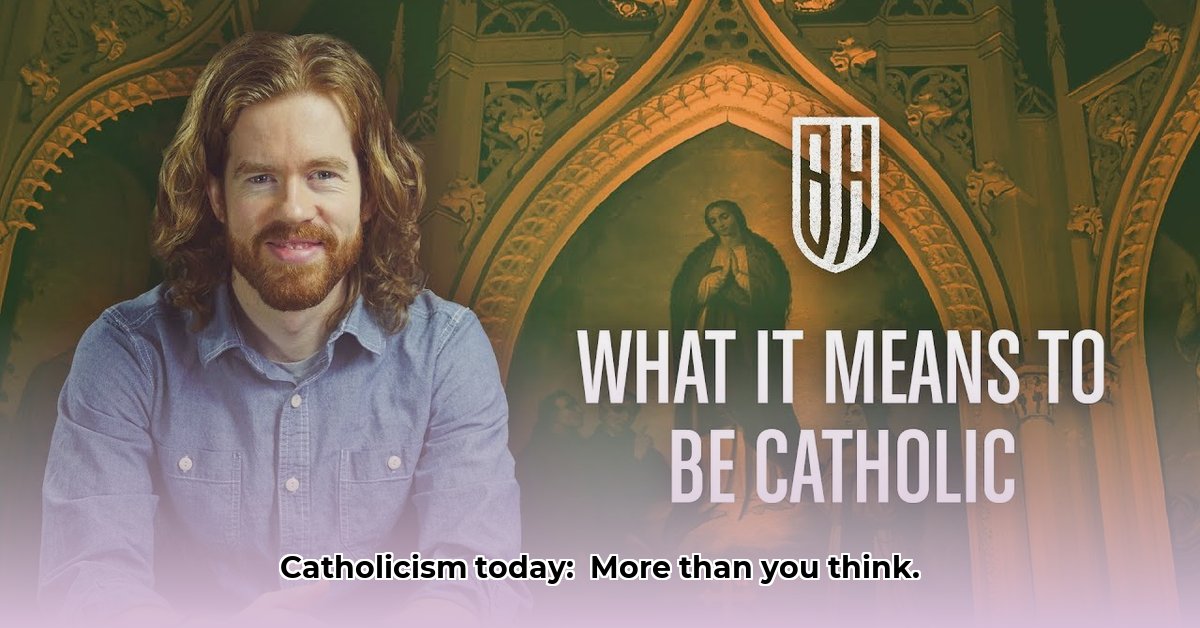Foundational Beliefs and Modern Relevance
Catholicism, a prominent branch of Christianity, distinguishes itself through its rich tapestry of beliefs, traditions, and practices. Rooted in the teachings of Jesus Christ and the apostles, Catholicism emphasizes the Trinity—the belief in one God existing as three distinct persons: Father, Son (Jesus Christ), and Holy Spirit. The Bible serves as a foundational text, narrating God’s interaction with humanity and revealing divine truths. However, alongside Scripture, Tradition—the accumulated wisdom and practices passed down through generations—plays a crucial role in shaping Catholic understanding and practice. This dynamic interplay between Scripture and Tradition informs how Catholics interpret their faith and live it out in the modern world. How do these ancient beliefs remain relevant in contemporary society?
Central to Catholic belief is the Incarnation—the belief that Jesus Christ is both fully God and fully human. This profound mystery affirms that God entered human history to redeem humanity from sin. Christ’s death and resurrection are pivotal events, offering salvation and eternal life to those who believe. These core beliefs shape Catholic spirituality and provide a framework for navigating life’s complexities. How do Catholics integrate these beliefs into their daily lives?
Sacraments: Encounters with the Divine
Seven sacraments mark significant moments of connection with God in the Catholic tradition. These are not mere symbolic rituals but tangible encounters with the divine, channels of God’s grace. They include:
- Baptism: Initiation into the Christian community, cleansing from original sin.
- Eucharist (Holy Communion): Receiving the body and blood of Christ, the source and summit of Catholic life.
- Confirmation: Strengthening of baptismal grace, sealing with the Holy Spirit.
- Reconciliation (Confession): Seeking forgiveness for sins and reconciliation with God and the Church.
- Anointing of the Sick: Spiritual and physical healing for those suffering from illness.
- Holy Orders: Ordination of deacons, priests, and bishops to serve the Church.
- Matrimony: Union of a man and a woman in a lifelong covenant of love, blessed by God.
These sacraments accompany individuals throughout their lives, offering spiritual nourishment and strengthening their relationship with God. How do these rituals shape the individual’s spiritual journey?
The Church, Mary, Saints, and Social Justice
The Catholic Church considers itself the original Church founded by Christ, guided by a hierarchical structure with the Pope as the successor of St. Peter and the bishops in communion with him. This structure, known as the Magisterium, aims to maintain consistency in teachings and practices across time and cultures. While the hierarchical structure has faced scrutiny and debate, its purpose is to preserve the integrity of the faith and guide believers. How does this structure function in the 21st century?
Catholicism sets itself apart through its reverence for Mary, the mother of Jesus, and the saints—individuals recognized for their holy lives. Catholics do not worship Mary or the saints but honor them as role models of faith and intercessors. Mary, as the Mother of God, holds a special place of honor. The saints, through their exemplary lives, inspire and encourage believers on their spiritual journey. How do these practices enrich the Catholic faith and provide guidance for its followers?
Catholic Social Teaching (CST) emphasizes the dignity of every human person and promotes social justice as an integral part of faith. Grounded in Gospel values, CST provides a framework for addressing social, economic, and political issues. Key principles include:
- Life and Dignity of the Human Person: Protecting human life from conception to natural death.
- Call to Family, Community, and Participation: Supporting families and promoting active participation in society.
- Rights and Responsibilities: Recognizing fundamental human rights and corresponding responsibilities.
- Option for the Poor and Vulnerable: Prioritizing the needs of the marginalized and disadvantaged.
- The Dignity of Work and the Rights of Workers: Promoting fair wages, safe working conditions, and the right to organize.
- Solidarity: Recognizing our interconnectedness and working for the common good.
- Care for God’s Creation: Protecting the environment and promoting sustainable practices.
How can individuals actively engage with CST principles to create a more just and compassionate world?
The Eucharist: A Central Act of Worship
The Eucharist, or Holy Communion, occupies a central place in Catholic worship. Catholics believe in transubstantiation—the doctrine that the bread and wine used in the Eucharist transform into the actual body and blood of Christ during Mass. This belief shapes the Catholic understanding of the Mass as a sacrificial offering, making present Christ’s sacrifice on the cross. The priest, acting in persona Christi, presides over this sacred act. This understanding differs from Protestant views, which range from symbolic interpretations to a belief in Christ’s spiritual presence (consubstantiation). This core difference has significant implications for worship practices and theological interpretations. How does this belief shape the Catholic understanding of the Mass and its significance in their lives?
The historical context of the Eucharist is essential to understanding its development. The formal definition of transubstantiation was established during the Fourth Lateran Council (1215) and reaffirmed during the Council of Trent (1545-1563). These pronouncements clarified Catholic doctrine amidst the theological debates of the Reformation and solidified its distinct understanding of the Eucharist. This historical backdrop sheds light on the evolution of Catholic thought and its impact on liturgical practices.
Catholicism and Protestantism: Key Distinctions
Catholicism and Protestantism, though sharing Christian roots, diverge on several key theological issues. These distinctions shape their respective beliefs, practices, and interpretations of faith.
Scripture and Tradition: Catholics value both Scripture and Tradition as sources of divine revelation, while many Protestants adhere to Sola Scriptura (Scripture alone). This difference influences how each tradition interprets biblical teachings and formulates doctrine.
Sacraments: Catholics recognize seven sacraments, viewing them as channels of God’s grace. Protestants typically acknowledge fewer sacraments, often emphasizing their symbolic nature rather than their efficacy as means of grace.
Church Structure and Authority: Catholicism maintains a hierarchical structure with the Pope as the ultimate authority. Protestants, in contrast, often favor more decentralized structures with varying degrees of authority vested in church leaders.
Mary, Saints, and Good works: Catholics venerate Mary and the saints, seeking their intercession. Protestants generally focus solely on Christ’s role as mediator. While both emphasize the importance of faith in salvation, Catholics also acknowledge the role of good works in cooperation with God’s grace, while many Protestants emphasize salvation by faith alone (Sola Fide).
These theological differences have significant ramifications for how Catholics and Protestants understand faith, practice their religion, and engage with the world around them. How do these differences inform their respective spiritual journeys and shape their responses to contemporary challenges?
- Unlock Filipino Culture: A Deep Dive into Traditions and Practices - April 23, 2025
- Unlock Spanish Culture: Insights & Opportunities Now - April 23, 2025
- White Spirit Uses & Substitutes: A Deep Dive for Pros & DIYers - April 23, 2025















